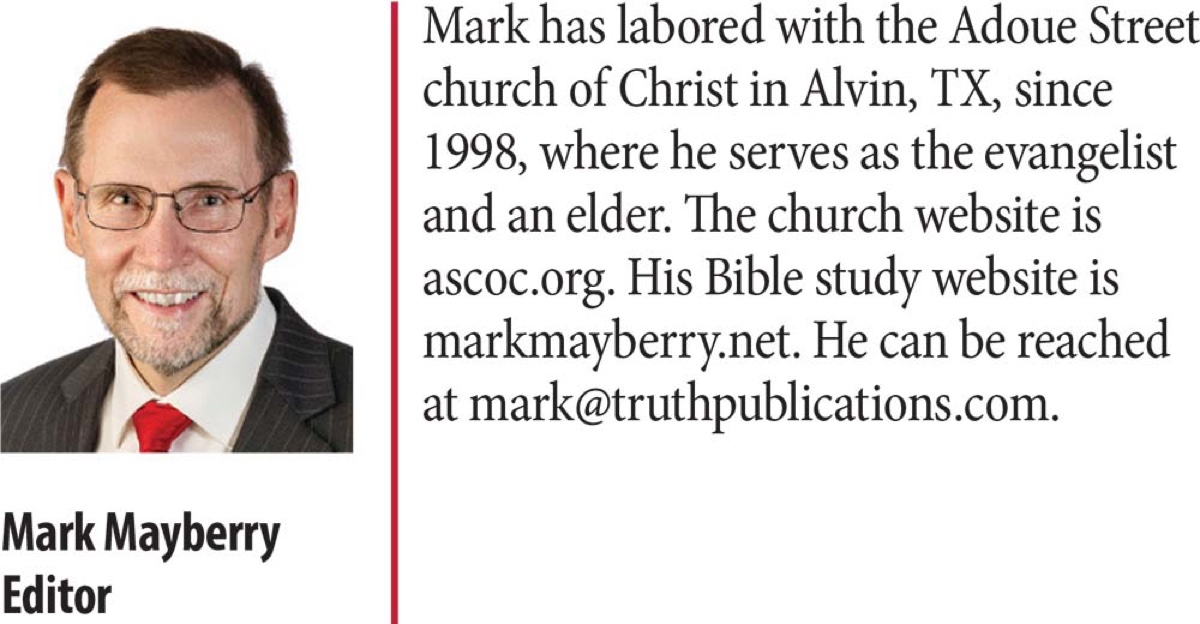by Mark Mayberry
Synopsis: This issue of Truth Magazine focuses upon the necessity of pursuing a God-centered education. Thanks to Kevin Maxey for selecting these topics and authors. My editorial serves as an introduction and overview of this important theme.
God’s promise to Abraham included three components: the land of Canaan, the nation of Israel, and the seed promise that pointed to Jesus Christ. The capital city of Jerusalem played a central role in both history and prophecy. Sadly, both Israel and Judah fell away, and suffered deportation and captivity.
In the prophetic book of Ezekiel, God expresses His disappointment with His people: “This is Jerusalem; I have set her at the center of the nations, with lands around her. But she has rebelled against My ordinances more wickedly than the nations and against My statutes more than the lands which surround her; for they have rejected My ordinances and have not walked in My statutes” (Ezek. 5:5-6). Nevertheless, Jeremiah delivered a message of hope to the exiles: “For I know the plans that I have for you,” declares the LORD, “plans for welfare and not for calamity to give you a future and a hope” (Jer. 29:11). Such plans would be realized through the faithful remnant who lived God-centered lives (Isa. 2:1-4).
While the book of Revelation was written in an hour of distress in which saints on earth were being persecuted and the church seemingly faced the potential of extinction; yet, calm prevailed in heaven and victory was assured. John records, “. . . before the throne there was something like a sea of glass, like crystal; and in the center and around the throne, four living creatures full of eyes in front and behind. . .” (Rev. 4:5-11). In a later vision, John sees Jesus, the lamb of God, standing triumphantly in the center of the throne (Rev. 7:13-17).
Please notice the use of the word “center” in each of the preceding quotations: God set Jerusalem at the center of the nations. God’s heavenly throne is situated in the midst of a crystal sea, and in the center and around the throne are four living creatures representing His power and perceptiveness. Jesus Christ, the captain of our salvation, stands in the center of the throne, serving as our Good and Great Shepherd.
Technically, the center (of something) is a point equidistant from all adjacent areas. Symbolically, the word “centered” describes a person who is stable and well-balanced, i.e., inwardly calm and steady. It also is descriptive of one who concentrates upon things that really matter and is not distracted by temptations or trivialities. Like a tightrope walker uses a pole to maintain balance, we maintain equilibrium through living prayerful, purposeful, precept-driven lives. Let us, therefore, be focused (Phil. 3:13-14) and grounded (Eph. 3:16-19), having our hope centered upon Jesus Christ.
Christians should cultivate God-centered homes. To enjoy happiness and harmony, our homes must be built upon divine precepts (Pss. 127, 128). As Solomon said, “Unless the LORD builds the house, they labor in vain who build it. . .” In contrast, he declares, “How blessed is everyone who fears the LORD, who walks in His ways. When you shall eat of the fruit of your hands, you will be happy and it will be well with you.” A God-centered life provides meaning to our labors, domestic structure, and an environment in which all members of the family can thrive.
Christians should embrace God-centered education. Elsewhere in this issue, you will find an excellent collection of articles (organized and arranged by Kevin Maxey) on the need for a God-centered education. As young people move toward maturity, the value of a good education becomes obvious. Yet, in progressing from dependency to independence, we must not leave God out of the picture. Instead, recall Paul’s prayer for the Colossians, in which he asked that they would “be filled with the knowledge of His will in all spiritual wisdom and understanding, so that you will walk in a manner worthy of the Lord, to please Him in all respects, bearing fruit in every good work and increasing in the knowledge of God” (Col. 1:9-12).
Moses spent the first forty years of his life as the son of Pharaoh’s daughter, living in the king’s palace, being educated in all the learning of the Egyptians (Acts 7:20-25). Yet, none of these privileges prepared Moses for his true calling—leading the people of Israel from captivity to freedom. During the next forty years, he learned leadership by serving as a shepherd. During the last forty years of his life, Moses learned obedience by submitting to God (Heb. 11:24-26).
Solomon’s journey to wisdom and understanding—along with fame and fortune—began with humility. When the Lord appeared to Solomon at the start of his reign, offering to grant any wish he might ask, he said:
Now, O LORD my God, You have made Your servant king in place of my father David, yet I am but a little child; I do not know how to go out or come in. Your servant is in the midst of Your people which You have chosen, a great people who are too many to be numbered or counted. So give Your servant an understanding heart to judge Your people to discern between good and evil. For who is able to judge this great people of Yours? (1 Kings 3:7-9).
Subsequently, God blessed Solomon with wisdom, discernment and breadth of mind (1 Kings 4:29-34; 10:1-10, 23-29). Sadly, with the passing of time, Solomon drifted from his earlier dedication and turned aside to a lifestyle of depravity (1 Kings 11:1-8). Yes, the conclusion of Ecclesiastes suggests that he eventually came to his senses (Eccl. 12:13-14), but the damage had already been done.
Despite being educated at the feet of Gamaliel, Saul of Tarsus was ignorant of God’s true plan and purpose (Acts 22:3-5; 26:9-11). However, after his conversion, Paul’s perspective changed dramatically. Addressing the Corinthians, he said, “I determined to know nothing among you except Jesus Christ, and Him crucified” (1 Cor. 2:1-5). Counting his credentialed past as worthless, Paul’s present goal was that “I may gain Christ, and may be found in Him, not having a righteousness of my own derived from the Law, but that which is through faith in Christ” (Phil. 3:8-9).
In every age, men haughtily dismiss divine wisdom. Sagacity scorns spirituality. The clay pot repudiates the Potter’s precepts. Despite these denunciations, God’s word endures (1 Pet. 1:22-25). His wisdom remains (1 Cor. 1:21-31).
Christians should offer God-centered service. Men frequently manifest a misguided understanding of acceptable service. Apostate Israel wholeheartedly embraced the worship of idols (2 Kings 17:16-17); yet, like the Athenians, their devotion was rooted in ignorance, indulgence, and misguided zeal (Acts 17:22-23).
While we must present our lives as a living sacrifice, above all else our spiritual service of worship must be acceptable to God (Rom. 12:1-2; cf. Heb. 12:25-29). In other words, we must be obedient. Our words and deeds must conform to the revealed pattern (Rom. 6:17-18; 2 Tim. 1:13-14).
Exhorting his young apprentice, Timothy, to “be strong in the grace that is in Christ Jesus,” the aged apostle compared discipleship to serving as a soldier, competing as an athlete and laboring as a farmer: Soldiers follow orders; athletes obey rules; farmers labor according to the laws of nature (2 Tim. 2:1-7).
Christians should seek a God-centered understanding of human suffering. When calamity strikes, people often ask, “Why me? Why mine?” In their anguish, they blame God—compounding their problems by committing blasphemy (Rev. 16:10-11).
The Book of Job is a treatise on human suffering. After calamity strikes Job (as recorded in chapters 1-2), the patriarch and his friends spend the next thirty-six chapters arguing about it. Note the summary and structure suggested by the Holman QuickSource Guide to Understanding the Bible:
The entire book may be organized into five sections, each with either a God-centered or a human-centered perspective: Job’s suffering (1-2, God-centered); Job’s disputes with his counselors (3-26, human-centered); Job’s and Elihu’s monologues (27-37, human-centered); God’s answer (38-41, God-centered); Job’s restoration (42; God-centered) (Easley, 116-117).
Jesus confronted commonly held misconceptions about calamity (Luke 13:1-5; John 9:1-3). Yes, there are times when human suffering is caused by our sinful choices. Yes, there are times when natural disasters are an expression of divine judgment. Yet, because of our limited perspective, we should show caution in assessing causality. Some said that the collapse of the twin towers on September 11, 2001, represented God’s judgment upon a sinful nation. Others assert that the COVID crisis reflects divine judgment upon this wicked world. Perhaps—Perhaps not. Certainly we believe in providence and prayer. We acknowledge God’s omniscience, omnipotence and omnipresence. He provides and protects. He guides and governs. Yet, absent the authoritative voice of an inspired prophet, let us show restraint in offering such explanations or assigning blame.
Because we live in a world under the curse of sin and death, suffering is part of our existence. Sometimes we suffer because of our bad choices, and sometimes because of our good choices. We may suffer because of the choices of others. Sometimes we suffer for no discernable reason. We often don’t understand—“Why?” Yet, in all this, remember Job: As calamity followed calamity, he manifested reverence and restraint (Job 1:20-22; 2:7-10). The patriarch retained God’s favor until he was provoked by the ignorant accusations of his “friends” and retaliated by leveling unfounded accusations against God. Remember that Satan, not God, brought sin into the world. Recall also that suffering can bring benefits, such as increased maturity (Lam. 3:27-29) and continued faithfulness (2 Cor. 12:7-10).
Let us live God-centered lives by cultivating God-centered homes, pursuing God-centered education, offering God-centered service, and seeking a God-centered understanding of human suffering.
Easley, Kendell H. Holman QuickSource Guide to Understanding the Bible. Nashville, TN: Holman Bible Publishers, 2002.



